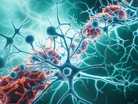McKinsey: Brain Health Underfunding 'a Global Concern'

Brain health encompasses more than the absence of disease, according to a report by the McKinsey Health Institute (MHI), a research organisation focused on improving global health.
The report defines brain health as including “overall cognitive functioning, resilience and a state of well-being in which individuals can cope with life's stresses and work productively”.
The prevalence of brain health conditions is significant, the report reveals. In the United States, 50% of people will experience a brain health condition in their lifetimes. These conditions can range from mild mood disturbances to severe, chronic health issues.
Brain health conditions can occur at any age, but the report notes that most mental illnesses become symptomatic by age 14, with nearly 90% peaking during a person's 20s. This pattern differs from other chronic physical health conditions, which typically peak in a person's 50s.
The COVID-19 pandemic compounded the situation, the report authors say; during the pandemic, anxiety and depression increased by up to 30% worldwide.
The global impact of brain health conditions is substantial. The report states that mental and substance use disorders underlie around 15% of the global disease burden. This includes direct impact from a person's brain health condition and any associated physical disorders.
Factors influencing brain health are diverse, the report reveals. Age, social determinants such as trauma and poverty, and genetics can increase the risk of developing conditions and affect symptom severity.
Cultural disparities in brain healthcare access
McKinsey also highlights geographical and cultural disparities in brain health care access. In low- and middle-income countries, only a quarter of people with brain health conditions receive treatment, compared with around 65% in high-income countries.
The economic burden of brain health conditions is significant, too according to the report. These conditions cost the global economy an estimated $2.5 trillion annually, with projections suggesting an increase to $6 trillion by 2030.
Employers also play a crucial role in the brain health ecosystem, the report authors say. A recent MHI global survey found that three in five employees report experiencing at least one mental health challenge during their careers.
McKinsey stresses the importance of early intervention and treatment, which might include psychotherapy, preventive or behavioural treatments, medication, social support, and digital tools.
Despite the prevalence of brain health conditions, the report reveals that brain health remains one of the least-addressed and least-resourced topics in health. High-income countries spend as little as 4% of their health budgets on mental health, while in lower-income countries, this can drop to as little as 1%.
Investment in brain health research is also lacking, the report authors say. Between 2015 and 2019, only 4% of scientific research grants globally were for mental health.
The report concludes by emphasising the interconnectedness of brain health with social, spiritual, and physical health. "By enhancing our brain's resilience, we can enjoy significant long-term benefits, including improved cognitive function, emotional well-being, and overall quality of life," the report states.
About McKinsey Health Institute
The McKinsey Health Institute (MHI) is a global health body set up by the consulting firm McKinsey & Company. Its aim is to provide analysis and insight to help advance human health in historically underinvested areas.
MHI does not directly provide consulting services but rather, serves to generate health insights that help advance health provision worldwide. It is staffed by teams of researchers, data scientists and health experts, and is a sister institute of the McKinsey Global Institute, the firm's business and economics research arm.




